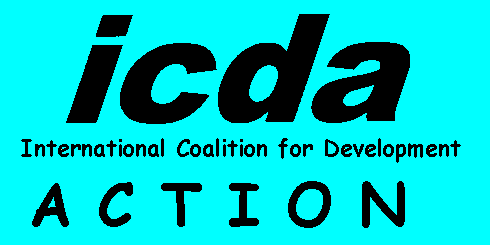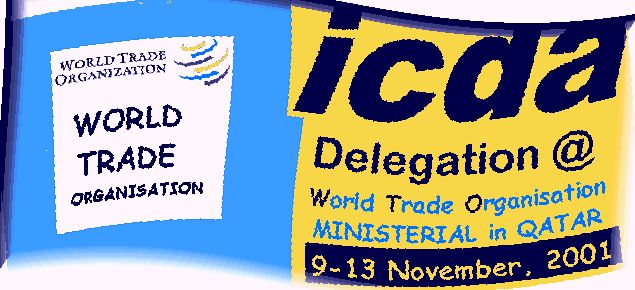
This site is best viewed with
| ICDA LATEST |
ICDA Latest News
Programme areas
ICDA History
| ICDA MEMBERS |
Current Members
| WTO IMPACT LIST |
Subscribe Here
What do you think?
| CENNT |
Latest News
IWGGT (in construction)
| PUBLICATIONS |
Latest ICDA Journal (in construction)
Latest ICDA Update (in construction)
| VACANCIES |
Internship
Book Keeper/Part time administrative Assistant
| HELP |
FAQ's
About Us
Contact Us

| LDCS >> REDRESS TRADE IMBALANCES -- FAWUNDU |
| By: Accra Mail |
"the ability of African countries to produce to meet the conditionalities set by the advanced nations has been affected by unfavourable domestic factors and the international environment."
Posted to the web May 27, 2001
Mr Alfred Sallia Fawundu, UN Coordinator, on Thursday called on the International Community to redress the global imbalances in trade regulation and investment.
He noted that efforts of developing countries through radical trade reforms in all sectors of the economy to improve the domestic conditions for investment have been hindered by conditionalities of the developed world.
Mr Fawundu said this at the opening of a week's workshop on "Civil society capacity building and strategy" for 45 participants drawn from 17 African countries in Accra.
The workshop organised by the Third World Network, Africa, with support from the United Nations Development Programme (UNDP) is aimed at addressing issues of international trade and investment within the context of the current developments in the World Trade Organisation (WTO).
It will also pay particular attention to on-going negotiations and preparations for the WTO ministerial conference to be held Qatar.
He said African countries and other developing nations need to develop a common voice to critically redress the global imbalances to allow all nations to negotiate effectively, to guarantee the creation of sustainable international trade regime based on needs and strengths of all parties.
Mr Fawundu said the development of a common voice would present a new challenge to African countries at the negotiating table as well as provide a platform for the private sector and other sections of society.
"Trade policy is an important frontier, which is defining the future of nations. Therefore, a common voice by developing countries is very critical and needs to be strengthened through improved knowledge and understanding."
Mr Fawundu said the ability of African countries to produce to meet the conditionalities set by the advanced nations has been affected by unfavourable domestic factors and the international environment.
"This situation calls for redress which requires not only the support of the international community, but the ability of African and other developing countries to participate effectively in shaping the global order.
"Developing countries must be involved in setting the rules and
regulations which guide global trade and investment in order that their particular interest and needs are reflected in this order."
Professor Akilagpa Sawyerr, Director of Research, Association of African Universities, expressed reservation about the current trade liberalisation policies, which tend to favour the developed world.
He urged African countries to unite and forge a common front through development of policies and capabilities to stand against the dictates of the advanced nations. Participating countries include Cameroon, Senegal, Nigeria, Togo, Benin, Gambia, Tunisia, Morocco, Egypt, Zimbabwe, South Africa, Burkina Faso, Mali, Chad, Kenya and Ghana. GNA
----------------------------------------------------------------------------
Copyright © 2001 Accra Mail. Distributed by AllAfrica Global Media
Please click here to go back to WTOMC Page
Copyright ©E.K.BENSAH II PRODUCTIONS. 1998-2001